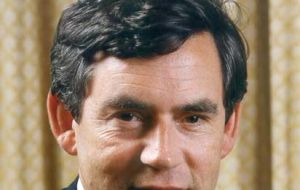MercoPress. South Atlantic News Agency
PM Gordon Brown rules out autumn election
 Mr. Brown's decision ends weeks of speculation
Mr. Brown's decision ends weeks of speculation Gordon Brown has said he will not call a general election this autumn. The PM said he wanted a chance to show the country his “vision for change” and to develop his policies further.
He said an election could have been held based on "competency" in dealing with crises, but he wanted to develop housing, health and education. Conservative leader David Cameron said Mr Brown had shown "great weakness and indecision", and had made a "humiliating retreat". Opposition leaders had challenged Mr Brown to end uncertainty over whether he would call an election after mounting speculation in recent weeks. 'Huge difference'Mr Brown, speaking exclusively to the BBC's Andrew Marr on Saturday in Downing Street, said: "I'll not be calling an election. I have a vision for change in Britain and I want to show people how in government we're implementing it "Over the summer months we've had to deal with crises, we've had to deal with foot-and-mouth, with terrorism, with floods, we had financial crises. "Yes, we could have had an election on competence and I hope people would have understood we have acted competently, but what I want to do is show people the vision we have for the future of this country in housing, health and education. "And I want the chance in the next phase of my premiership to develop and show people the policies that are going to make a huge difference and make a change in the whole country itself," he added. The prime minister was asked by Andrew Marr whether there would be no election for a long time to come. Mr Brown said: "I think it's very unlikely that this will happen in the next period. "I think the important thing is that we get on with the business of change in this country because people do want change and I'm responding to that demand." Our correspondent said: "I would say in effect, unless something extraordinary happens, he is ruling out a general election either this year or in 2008." Speculation had been mounting that the prime minister would call a November election after changes to Parliamentary announcements, such as a statement on Iraq next week. Mr Cameron said: "The reason the prime minister has cancelled this election is that the Conservative Party is making the arguments about the changes this country needs. People are responding very positively to our proposals. "The prime minister has shown great weakness and indecision. "It's quite clear he's not been focussed on running the country these last few months, he's been trying to spin his way into a general election campaign and now he's had to make a humiliating retreat." Marginal seatsLiberal Democrat leader Sir Menzies Campbell said the prime minister's decision showed "a loss of nerve". "He should have stated his intentions, clearly and unequivocally. The inevitable conclusion is that he's been acting in the interests of the Labour Party and not in the interests of the country." The two dates that were most widely touted for an election had been 1 and 8 November. Speculation had grown when the government also moved forward plans to outline its Comprehensive Spending Review - which sets long-term spending plans - and pre-Budget report to Tuesday, rather than late October. BBC political editor Nick Robinson suggested the main reason for not calling a snap election would be an unfavourable poll of marginal seats showing a swing to Tories. A poll to be published by Sunday's News of the World puts the Tories ahead by 6% in marginal seats, with the party overall at 44% against Labour's 38%. Translated into a general election, it would mean a hung Parliament with Labour holding 306 seats and the Tories 246. 'Verdict' electionOur political editor says the prime minister wants to win with a mandate for real change, but does not think he could do that with an early election, and consequently may not call an election until 2009. He says Mr Brown will now plump for a "verdict election" - one based on his actual performance, not on how people think he may do in the future. "This will be a day, a weekend and probably a week of red faces, of awkward headlines and embarrassment for those around Gordon Brown," he said. The decision would damage the morale of the Labour Party, he added. 'Not realistic'The BBC's head of political research, David Cowling, said the speculation had had to be stopped one way or another. "The polls post the Conservative conference have been very good for the Conservatives, the poll that's coming out in marginal seats is very good for them, so it's all drifting in the wrong direction and it's not the sort of moment I think at which a prime minister could turn to his troops and say: 'Well the tide's against us - forward to victory!' "It wasn't a realistic scenario and he's now having to put a stop on it." Other recent opinion polls have suggested that Labour's lead over the Conservatives has fallen. An ICM poll for the Guardian newspaper on Friday suggested the Conservatives and Labour were level - on 38% - compared with a 7% lead for Labour one month ago. The poll surveyed 1,008 adults on Wednesday and Thursday, after Mr Cameron's address to the Conservative conference in Blackpool. And the results of an earlier YouGov survey for Channel 4 News - which interviewed 1,741 people, also on Wednesday and Thursday - suggested the government, on 40%, was four points ahead of the Tories compared with a lead of 11 points last week. (BBC)




Top Comments
Disclaimer & comment rulesCommenting for this story is now closed.
If you have a Facebook account, become a fan and comment on our Facebook Page!